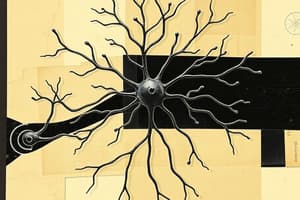Podcast
Questions and Answers
What type of neurons make up the peripheral nervous system (PNS)?
What type of neurons make up the peripheral nervous system (PNS)?
- Motor neurons only
- Sensory and motor neurons (correct)
- Sensory neurons only
- Interneurons
How does the nervous system transmit signals between different parts of the body and the brain?
How does the nervous system transmit signals between different parts of the body and the brain?
- By electrochemical signaling (correct)
- Via hormonal communication
- Through mechanical vibrations
- Through chemical reactions
Which part of the nervous system processes information received from sensory neurons and initiates responses through motor neurons?
Which part of the nervous system processes information received from sensory neurons and initiates responses through motor neurons?
- Somatic nervous system
- Central nervous system (correct)
- Enteric nervous system
- Autonomic nervous system
What is essential for maintaining the health of the nervous system?
What is essential for maintaining the health of the nervous system?
Which part of the nervous system includes all the nerves outside of the brain and spinal cord?
Which part of the nervous system includes all the nerves outside of the brain and spinal cord?
What is the main responsibility of motor neurons in the body?
What is the main responsibility of motor neurons in the body?
What is responsible for the conduction of electrochemical stimuli throughout the body?
What is responsible for the conduction of electrochemical stimuli throughout the body?
Which part of the brain uses approximately 20% of the total oxygen we breathe?
Which part of the brain uses approximately 20% of the total oxygen we breathe?
What is the function of the peripheral nervous system (PNS)?
What is the function of the peripheral nervous system (PNS)?
How many main lobes can the brain be divided into?
How many main lobes can the brain be divided into?
Which system is responsible for controlling body temperature and heart rate?
Which system is responsible for controlling body temperature and heart rate?
What is the function of the spinal cord in the nervous system?
What is the function of the spinal cord in the nervous system?
Flashcards are hidden until you start studying
Study Notes
The Nervous System: Understanding the Organized Group of Cells Specialized for the Conduction of Electrochemical Stimuli
The nervous system is an organized group of cells specialized for the conduction of electrochemical stimuli from sensory receptors throughout the body. It is responsible for sending and receiving messages between different parts of the body and the brain, allowing for coordination of responses to internal and external changes. The nervous system is a complex network that plays a crucial role in our daily functions, and it is composed of two main parts: the central nervous system (CNS) and the peripheral nervous system (PNS).
Central Nervous System (CNS)
The CNS consists of the brain and spinal cord and is responsible for controlling thought, movement, emotion, breathing, heart rate, hormones, and body temperature. The brain, the most complex organ in the body, uses approximately 20% of the total oxygen we breathe. It contains a vast number of neurons, with an estimated 100 billion neurons in the human brain. The brain can be divided into four main lobes: temporal, parietal, occipital, and frontal. The spinal cord, which runs from the base of the brain to the lower back, contains threadlike nerves that branch out to every organ and body part.
Peripheral Nervous System (PNS)
The PNS includes all the nerves outside of the brain and spinal cord. The PNS is made up of sensory neurons, which send information from the eyes, ears, nose, tongue, and skin to the brain, and motor neurons, which carry messages away from the brain to the rest of the body to allow muscles to move. The PNS is responsible for transmitting sensory information from the body to the brain and for controlling the body's voluntary movements.
How the Nervous System Works
The nervous system works by sending and receiving electrical signals between different parts of the body and the brain. Neurons, the cells that make up the nervous system, transmit these signals through a process called electrochemical signaling. Sensory neurons detect changes in the environment and send signals to the brain, which then processes the information and sends signals to motor neurons to initiate a response. This process allows the body to respond to internal and external changes in a coordinated manner.
Maintenance and Health
Maintaining the health of the nervous system is essential for optimal functioning. Regular exercise, a balanced diet, and avoiding excessive stress can help keep the nervous system healthy. It is also important to seek medical attention if experiencing symptoms that may indicate a nervous system condition, such as sudden changes in health or signs of a stroke or seizure.
In summary, the nervous system is a complex network of cells specialized for the conduction of electrochemical stimuli from sensory receptors throughout the body. It consists of the central nervous system (CNS), which includes the brain and spinal cord, and the peripheral nervous system (PNS), which includes all the nerves outside of the CNS. The nervous system works by sending and receiving electrical signals between different parts of the body and the brain, allowing for coordinated responses to internal and external changes. Maintaining the health of the nervous system is crucial for optimal functioning, and it can be supported through regular exercise, a balanced diet, and stress management.
Studying That Suits You
Use AI to generate personalized quizzes and flashcards to suit your learning preferences.




